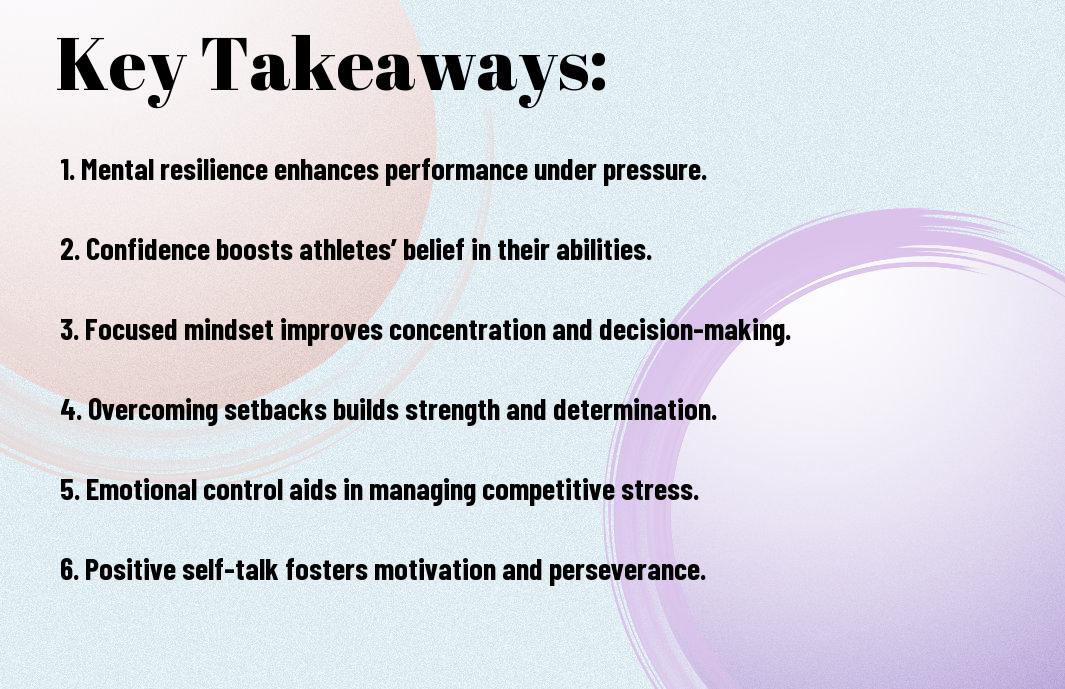You may often hear about physical training and skill development as key components of athletic success, but mental toughness plays an equally vital role in your performance. This mental resilience allows you to push through challenges, stay focused under pressure, and remain committed to your goals. By honing your mental toughness, you’ll enhance your ability to cope with adversity, manage stress, and maintain confidence in your skills, ultimately leading to improved outcomes in your sport. Understanding and developing this critical aspect can set you apart from your competitors and elevate your overall athletic experience.
Key Takeaways:
- Mental Resilience: Athletes showcase their ability to bounce back from setbacks and failures, which is vital for sustained performance.
- Focus and Concentration: The capability to maintain focus during high-pressure situations significantly impacts an athlete’s performance.
- Emotional Regulation: Managing emotions effectively allows athletes to perform consistently without being derailed by stress or anxiety.
- Goal Setting: Establishing clear and achievable goals helps athletes stay motivated and driven towards their performance objectives.
- Confidence Building: Developing mental toughness enhances self-belief, enabling athletes to take risks and tackle challenges head-on.

Defining Mental Toughness
Before delving into the depths of sports performance, it’s imperative to understand what mental toughness really means. It’s the ability to remain focused, resilient, and determined even in the face of adversity. Mental toughness allows you to persevere through challenges, maintain a positive attitude, and consistently perform at your best, regardless of external pressures or setbacks.
Characteristics of Mentally Tough Athletes
Below are key traits that define mentally tough athletes. They demonstrate unwavering confidence, focus on their goals, and maintain a high level of commitment to their training. Moreover, they adapt well to change and recover quickly from setbacks, viewing challenges as opportunities for growth rather than obstacles.
The Psychology Behind Mental Resilience
Mentally tough athletes possess a unique psychological makeup that contributes to their resilience. They tend to have a strong sense of self-efficacy and a growth mindset, which drives them to embrace challenges and view failures as learning experiences.
Athletes often cultivate mental resilience through deliberate practice and exposure to stressors. This mindset can be reinforced by setting realistic goals and maintaining a positive internal dialogue. By focusing on what you can control and developing coping strategies, you can enhance your ability to bounce back from adversity. Building mental resilience not only improves your performance in sports but also helps you in everyday challenges, creating a robust foundation for success both on and off the field.
The Role of Mental Toughness in Performance
Some athletes underestimate the profound impact mental toughness has on their overall performance. This psychological strength not only affects how you respond to pressure but also shapes your confidence and resilience. Athletes who cultivate mental toughness are better equipped to handle challenging situations and maintain peak performance, even when faced with intensely competitive environments.
Overcoming Adversity in Sports
Behind every successful athlete lies a story of overcoming adversity. Whether it’s dealing with injuries, setbacks, or fierce competition, your ability to confront and navigate these challenges defines your sporting journey. Mental toughness enables you to push through hardships and emerge stronger, ultimately leading to greater achievements.
Maintaining Focus and Consistency
Behind the scenes of every great performance is a dedication to focus and consistency. As an athlete, your ability to concentrate on your goals and maintain a disciplined routine sets you apart from the competition. Mental toughness plays a vital role in keeping distractions at bay, allowing you to fully engage in your training and competitions.
Consequently, honing your focus not only enhances your performance but also reinforces the habits necessary for long-term success. By concentrating on your training regimen and minimizing external distractions, you’ll find it easier to execute your skills consistently under pressure. This unwavering commitment to improvement empowers you to elevate your game while instilling a sense of confidence that persists throughout your athletic career.

Strategies to Develop Mental Toughness
Keep in mind that developing mental toughness is a strategic process. Incorporating consistent techniques can greatly enhance your resilience. Research highlights the impact of mental toughness on athlete’s performance and overall well-being. You’ll find that structured approaches, such as visualization, goal setting, and mindfulness, can foster the tenacity needed to push through challenges in sports.
Visualization Techniques
Beside traditional training, visualization techniques play a vital role in building mental toughness. By mentally rehearsing your performance and envisioning success, you create neural pathways that enhance your actual performance. Committing to visualization sessions can help boost your confidence and reduce anxiety before competitions.
Goal Setting and Mindfulness Practices
Above all, setting clear goals combined with mindfulness practices can significantly enhance your mental toughness. These strategies keep you focused and present, enabling you to break down larger objectives into manageable tasks. This focused mindset aids in maintaining motivation and clarity under pressure.
For instance, by setting SMART (Specific, Measurable, Achievable, Relevant, Time-bound) goals, you can track your progress and celebrate small victories along your journey. Coupling this with mindfulness practices, such as meditation or deep-breathing exercises, will help you stay centered and calm, ultimately enhancing your performance and boosting your mental strength.
The Impact of Coaching on Mental Toughness
Not all coaches recognize the significance of instilling mental toughness in their athletes. Effective coaching goes beyond technical skills, emphasizing resilience, composure under pressure, and the ability to push through adversity. As a coach, you have the power to cultivate a mindset that embraces challenges, encouraging your athletes to develop a strong mental framework. When you prioritize mental toughness in your coaching philosophy, you lay the groundwork for athletes to excel not only in sports but also in life.
Building a Mentally Tough Team Culture
Before fostering a mentally tough team culture, assess the current dynamics and values within your team. Establish an environment where challenges are viewed as opportunities for growth. Promote communication, trust, and support among team members, ensuring everyone understands the importance of resilience. Encourage athletes to share their experiences and learn from one another, reinforcing a collective approach to developing mental toughness and fostering a sense of unity.
Training Methods and Mental Resilience
Along with creating a supportive culture, incorporating specific training methods can enhance mental resilience among your athletes. Strengthening mental toughness requires deliberate practice that challenges individuals to confront their limits, overcome setbacks, and stay focused under pressure. By integrating mental conditioning techniques such as visualization, goal-setting, and positive self-talk into your training regime, you empower athletes to build a robust mental framework that will serve them well during competition.
Further, utilizing simulations of high-pressure scenarios during practice can be exceptionally beneficial. By replicating the intensity and unpredictabilities of actual competition, you help athletes learn to manage stress and maintain focus. This not only reinforces their tactical skills but also fortifies their mental resilience. Consider integrating team-building exercises that foster camaraderie and shared experiences, ensuring that your athletes face challenges cohesively, as a united front capable of overcoming obstacles both on and off the field.
Case Studies of Mentally Tough Athletes
After exploring the foundations of mental toughness, it’s vital to look at real-world examples. Here are several case studies showcasing athletes renowned for their mental resilience:
- Michael Jordan: Overcame numerous setbacks, including being cut from his high school basketball team, to become a six-time NBA champion.
- Serena Williams: Faced health challenges and personal tragedies but returned to win 23 Grand Slam titles.
- Tom Brady: Overcame early career doubts, leading to seven Super Bowl victories, proving persistence pays off.
- Usain Bolt: Battled injuries and setbacks but still clinched eight Olympic gold medals, reflecting unwavering determination.
Iconic Stories of Perseverance
Above all, the stories of athletes like Lance Armstrong, who returned to sports after battling cancer, remind you that mental toughness can often mean overcoming life’s extraordinary challenges. Their journeys illustrate remarkable determination, showing you that greatness often requires pushing through adversity.
Lessons Learned from Elite Performers
Along your journey, elite performers teach you vital lessons about mental toughness, one of which is the importance of maintaining focus and resilience under pressure. Their experiences highlight how honing your mindset can greatly influence your performance.
A key takeaway from observing elite athletes is the intentional practice of mental toughness strategies. They utilize visualization techniques, set specific goals, and maintain a positive self-talk routine. By integrating these methods into your training, you can enhance your mental grit, enabling you to navigate challenges effectively and succeed under pressure. Ultimately, following their example allows you to cultivate a mindset that can elevate your performance in sports and beyond.
The Connection Between Mental Toughness and Injury Recovery
Despite the physical challenges you may face during injury recovery, mental toughness plays a pivotal role in your rehabilitation. Your mindset can significantly influence your recovery speed and effectiveness, fostering resilience against the psychological hurdles that arise. Embracing mental toughness in sports: the psychology of mind set can enhance your overall performance and diminish the emotional toll of setbacks.
Mental Strength During Rehabilitation
Below are strategies you can utilize to bolster your mental strength throughout your rehabilitation process. Setting realistic goals, maintaining a positive outlook, and visualizing successful recovery can empower you to stay focused and motivated. By developing a strong mental framework, you’ll enhance your ability to cope with the physical limitations caused by your injury.
The Role of Support Systems
Recovery from an injury can be a challenging journey, but the support systems you have in place can make a significant difference. By surrounding yourself with teammates, coaches, friends, and family, you create a network that provides encouragement and accountability. Having individuals who understand your struggles helps you stay motivated and can lighten the emotional burden of recovery.
Indeed, these support systems serve as a vital source of strength during your rehabilitation. Engaging with them promotes a sense of belonging and camaraderie, allowing you to share your experience and learn from others who may have faced similar situations. Their encouragement can foster resilience, help you stay committed to your recovery, and ultimately enhance your return to sport. Building strong connections with your support systems may well be the key to thriving in your rehabilitation journey.
Conclusion
As a reminder, developing mental toughness in sports is important for enhancing your performance and resilience. It empowers you to navigate challenges, maintain focus under pressure, and consistently achieve your goals. By fostering a strong mental attitude, you transform not just your game, but your overall approach to competition and teamwork. Investing in your mental strength will undoubtedly elevate your athletic journey and personal growth, allowing you to thrive, regardless of the obstacles you face.
Q: Why is mental toughness considered imperative for athletes?
A: Mental toughness is fundamental for athletes as it enables them to perform at their best under pressure. It involves having the resilience to face challenges, maintain focus, and push through adversity during competitions. Athletes with strong mental toughness are able to set and achieve goals, recover from setbacks, and maintain motivation over a long season. This mental fortitude sets them apart from their competition, allowing them to excel in critical moments and sustain high levels of performance.
Q: How does mental toughness affect an athlete’s performance?
A: Mental toughness greatly influences an athlete’s performance by shaping their mindset and reaction to various competitive situations. Athletes who possess this resilience tend to exhibit greater confidence, enhancing their ability to make decisions under duress. Furthermore, mental toughness allows individuals to maintain composure, even when faced with challenging or unexpected circumstances, helping reduce anxiety levels which can hinder performance. This ability to remain focused and driven often leads to improved outcomes during events.
Q: What strategies can athletes use to develop mental toughness?
A: Athletes can adopt several strategies to cultivate mental toughness, including setting realistic goals, engaging in visualization techniques, and practicing mindfulness. Regularly reviewing their performance and identifying areas for improvement fosters a growth mindset. Incorporating routine stress management techniques, such as deep breathing exercises and positive self-talk, can also enhance resilience. Finally, seeking feedback from coaches and peers promotes a supportive environment that further strengthens an athlete’s mental resilience over time.


